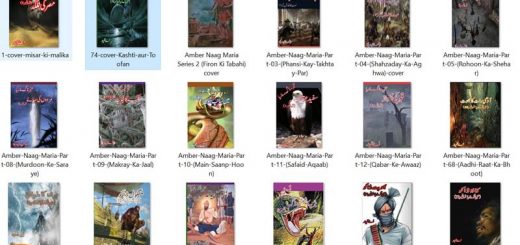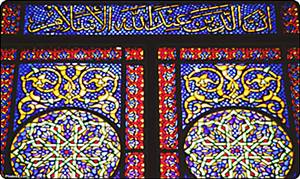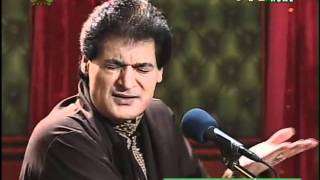My Top Ten Novels by Desi Writers – By A. Naqshbandi
The history of desi fictional writing in the English language has a fairly long history and includes works which are now considered classics of English literature.
Amongst these novels we will find titles such as A House for Mr. Biswas by the Nobel laureate and Trinidadian Indian author V. S. Naipul and the great Indian writer R. K. Narayan who wrote the masterpiece, The Untouchable. In addition to these there are also acclaimed writers such as Salman Rushdie, who won the Booker of Bookers with his book, Midnight’s Children and the celebrated Rohinton Mistry’s A Fine Balance. To these one could also add In Custody by Anita Desai, another winner of the Booker Prize, and the names of more recent celebrated desi writers such as Monica Ali (Brick Lane) and Pulitzer prize-winning Jhumpa Lahiri (The Interpreter of Desires; The Namesake) as well as Kiran Desai (daughter of Anita) whose work, “The Inheritance of Loss”, also won the coveted Booker prize in 2007 and Mohsin Hamid’s Moth Smoke and The Reluctant Fundamentalist. However I will pick none of these works in my list. This is either because I have yet to read them or because, having read them, I did not particular like them, or, did not think them worthy of inclusion in such a list. After all any list of favourites has to be subjective by definition but I would say that what all the books have in common is that they are beautifully written. I am a prose stylist and all my choices reflect this bias.
This then is a list of my top ten novels written by desi writers in no particular order other than the one in which the books came to my mind! I have deliberately included a few novels written in Urdu because my remit was to enumerate those novels written by desis which I consider to be the best (for whatever reason and these will be explained below) I have yet read and not just the best English-language desi novels. Besides, all the novels included have been translated into English anyhow and are easily available.
1. Maps for Lost Lovers by Nadeem Aslam
Without doubt, this is the best-written novel by a writer of desi origin which I have had the pleasure of reading. Mr. Aslam’s tale of honour killings in an unnamed British town inhabited by Pakistani immigrants is full of prose which can only be called Nabokovian. Here is a prose-master at work on a tale which is riveting and of great social significance in itself, highlighting the different problems of integration faced by Pakistani immigrants to the UK of first, second and third generations as well as the intergenerational tensions this causes. This book would make this list for its prose style alone but combined with a great descriptive flair, mastery of language and brilliant development of characters, especially Chanda and Shamas, it makes this novel one of the best I have read in recent years. In terms of mastery of prose I would put Nadeem Aslam in the same bracket as John Banville and Alan Hollinghurst. A great novel.
2. Psychoraag by Suhail Saadi
A novel which, though critically acclaimed in its native Scotland (it made the list of 100 best Scottish novels of all time) remains largely unknown outside specialist literary circles, this is a beautifully written and ambitious tour-de-force telling the story of a radio DJ’s last night on the air. As the narrator counts down his last hours transmitting on the radio show which he hosts we are treated to a riveting account of both his life in Glasgow and that of his mother and father who immigrated here from Pakistan. Touching on themes common to much immigrant writing it nevertheless rises above the pack for the uniqueness of the author’s vision and its magical realism and clever use of music and language (a mixture of English, Scottish slang, and a Urdu-Panjabi hybrid) and the brilliant execution. The novel grips from its opening lines and doesn’t let go until the end. Here is a writer of prodigious talent.
3. An Equal Music by Vikram Seth
This justly celebrated novel of love lost, regained, and lost again is Seth’s masterpiece and much better, in my opinion, than his better known A Suitable Boy. Set in the world of classical music it follows the affair between a violinist in a Quarter and his beloved Julia, pianist and moves between London, Venice, and Vienna and is written in Seth’s enchanting prose. It is also full of descriptions of classical music, particularly that of Bach and Beethoven. A wonderful book.
4. Umrao Jaan Ada by Mirza Muhammad Hadi Ruswa
This novel about the life of a courtesan in nineteenth century Lucknow is usually (and in my opinion justly) regarded as the greatest novel of all Urdu literature. In addition to exquisite Urdu prose the characterisation in this novel is superb and brings all the myriad characters to life, both major and minor. In particular it is a great source of knowledge about life in Lucknow of that era and thus has an importance beyond that of being a great novel. Indeed, such was the vividness of Ruswa’s prose and descriptions and so accurate the detail and description of life in India’s famed city of pleasure and belle-lettres that many people thought that the heroine was an actual courtesan and went out in search of her! Indeed, the question of whether Umrao Jaan was based on an actual courtesan of that name has never been settled. The book has been translated twice into English—once by Khushwant Singh and, more recently, by David Matthews of SOAS. In my opinion, although Singh’s translation is abridged (much of the poetry is omitted) it reads much better and is closer in tone to the Urdu original. If you liked Memoirs of a Geisha, you’ll love this!
5. Aag Ka Darya by Qurratulain Hyder
Arguably the most ambitious undertaking in Urdu literature, this philosophical novel spans over two thousand years and tries to explain via an Orlando-like structure the entire history of philosophical thought in India. Beginning in the times of the Vedas it follows certain key characters over two thousand years as they are reborn with slightly different names in different places and times in India from before the birth of Christ to the era of the Raj and beyond. A great critical and commercial success it was “transcreated” by the author herself into English as River of Fire. Highly ambitious and demanding it is worth the effort.
6. A Suitable Boy by Vikram Seth
Probably the longest single novel in the English novel this mammoth work is an astonishing feat of literary creation comparable in scope to Tolkien’s Lord of the Rings. Of similar length it tells the tale, through the stories of Lata and her friends and siblings of India since independence. The lives of the three families whose members provide the characters are a microcosm of multifaith, multicultural India since 1947—in particular the complex love-hate relationship between Islam and Hinduism! It is, in truth, a number of novels joined together brilliantly into one giant whole and, unsurprisingly has some parts which do drag but that is almost inevitable in a novel of such length. Overall though I know of very few works comparable to it perhaps the Alexandria Quartet by Durrell. Definitely a masterpiece and worth the considerable time and effort required.
7. Twilight in Delhi by Ahmed Ali
This novel, written before Independence, tells the story of an upper-middle class Muslim family of Delhi and the effects of the 1857 Mutiny upon its fortunes. It is beautifully written and contains lovingly described rituals and details of family life. It is in these descriptions of a way of life now vanished, sadly, forever that the major interest in this novel lies although the central plot is also interesting: a young man falls in love with his beautiful cousin and begins to plot to marry her. In a culture where love marriages were almost unheard of this is not easy. Contemporary readers will be interested in the gentle, devotional Islam depicted therein and the vivid contrast with the perverted political form of our own times. If you wish to understand what classical Islamic culture was like this novel is a great place to begin.
8. A River Sutra by Gita Mehta
This novella is exquisitely written and is really a series of disparate tales of various manifestations of spiritual quest in India by different characters. Each tale is like a jewel and Mehta’s language is beautifully simple and captivating. In this she reminds me of Haruki Murakami. Most haunting of all is the story of the young boy with the divine voice who sings devotional songs. A lovely little book about spirituality in the vein of Hesse’s Siddhartha it will lift your spirits and move you in equal measure. An overlooked little gem!
9. Bazaar e Husn (Courtesans’ Quarters) by Munshi Premchand
This is the other great courtesan novel of Urdu literature. A high caste Hindu woman causes outcry in her community when she decides to become a courtesan leading to attempts by various people to reform her and rescue her from her life of sin. The author uses this tale to highlight the hypocrisy of society in its attitudes towards women with brilliant and biting observations via the mouth of the brilliantly developed main protagonist. It is also hailed as a classic and has been translated into English and published by Oxford University Press as Courtesans’ Quarters.
10. The God of Small Things by Arundhati Roy
This gorgeous book, set in Southern India, tells the the coming out story of a young boy afraid to express his bourgeoning homosexual feelings in a conservative society. The book was famous for the exquisite and exotic language and metaphors employed by Ms. Roy. Since then, sadly, Ms. Roy has not written any more fiction, choosing instead to use her fame to write polemical tracts about the environment and other political issues such as India and Pakistan’s nuclear programmes. A worthy cause but the world of literature is poorer for it. A deserved winner of the Booker.













